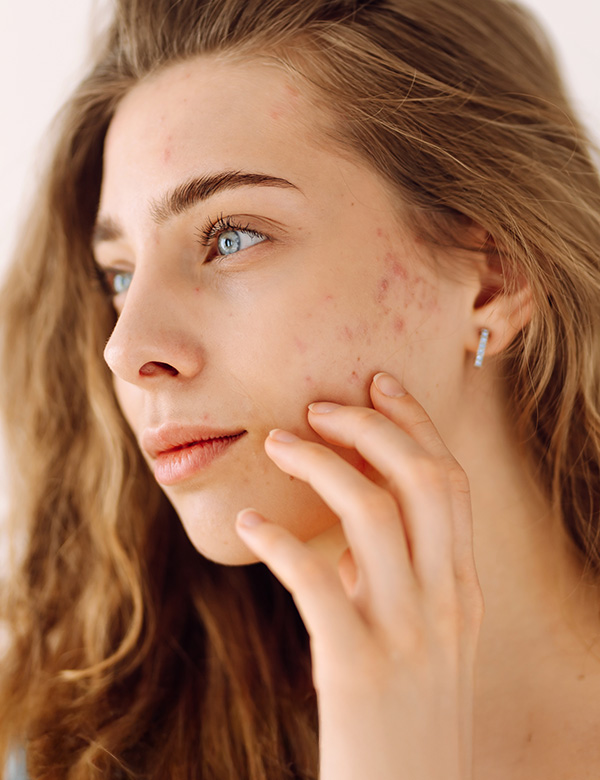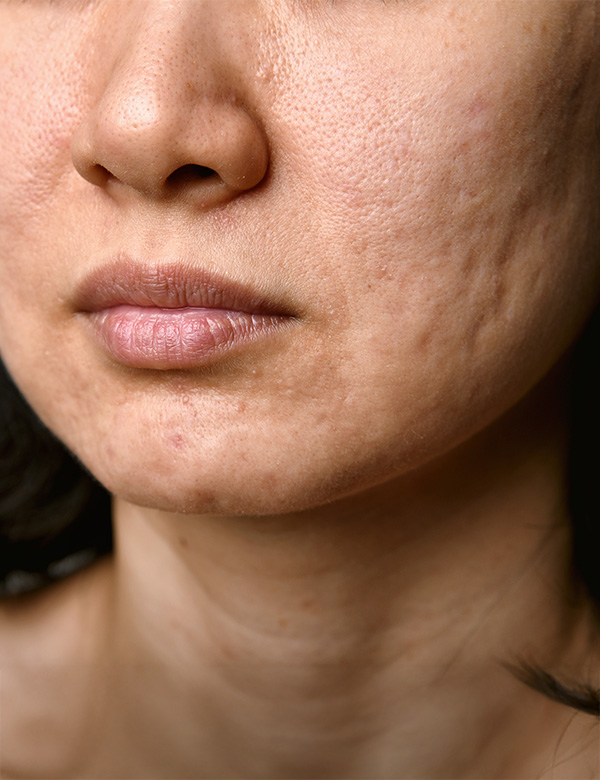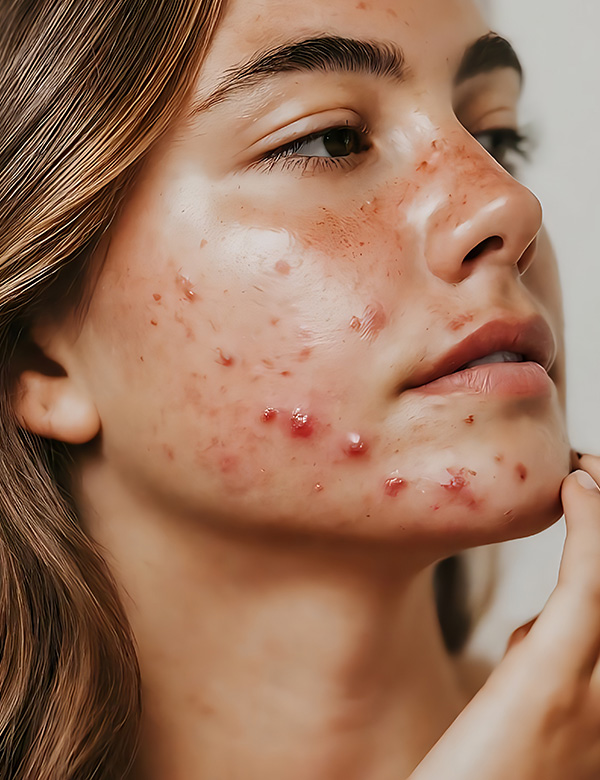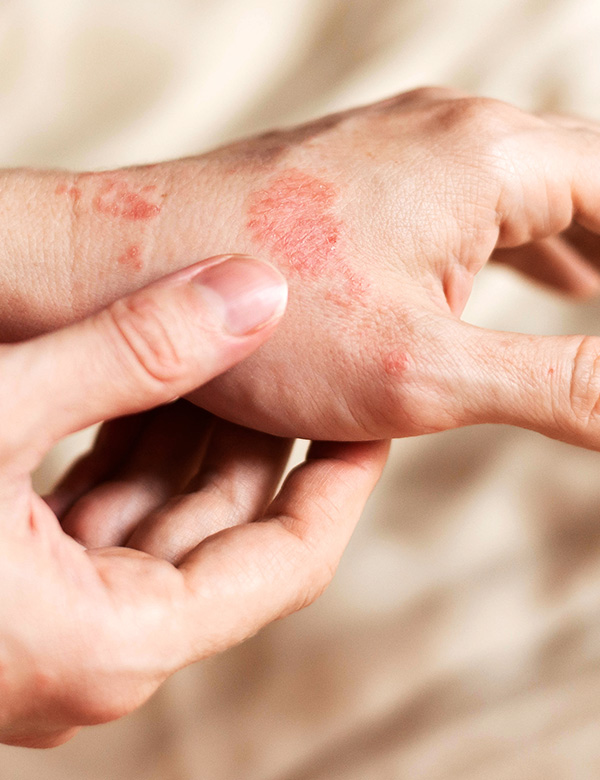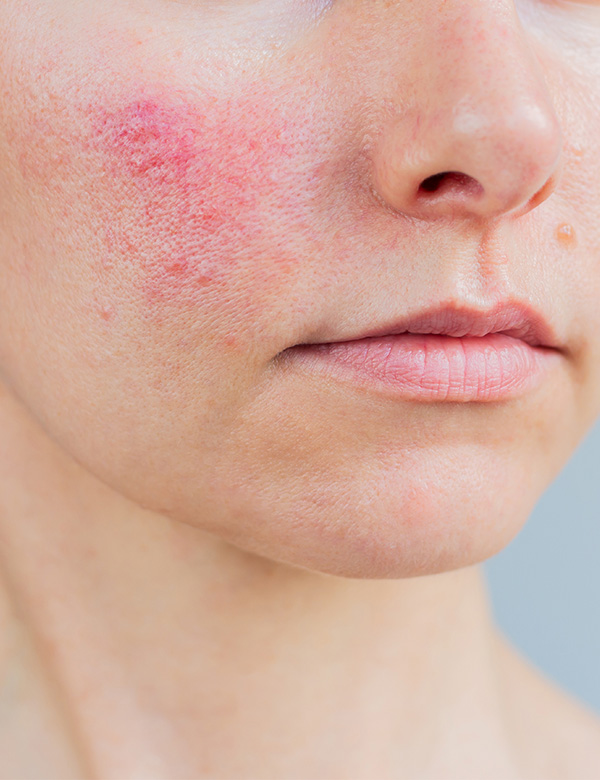Hidradenitis suppurativa
Chronic abscesses and painful lumps (nodules) – assessed and treated by experienced dermatologists at Derma Medical Clinic in Zurich – Sihlcity
Hidradenitis suppurativa
Chronische Abszesse und schmerzhafte Knoten durch erfahrenen Hautarzt abklären und behandeln in der Derma Medical Clinic in Zürich - Sihlcity
Chronic, recurring inflammation in the form of abscesses, tunnels under the skin (fistulas) and painful nodules – often in the armpits, groin or buttocks: hidradenitis suppurativa is frequently diagnosed late. In our acne consultation, we carry out a thorough evaluation and recommend the best treatment for your symptoms.
Examinations
Thorough skin examination
Evaluation of other potential causes
Therapy
Medicinal treatment
Minor surgical procedures
Supportive skin care
Duration
approx. 20–30 minutes
What is hidradenitis suppurativa?
Hidradenitis suppurativa (also called acne inversa) is a chronic skin condition that causes repeated painful lumps (nodules) and abscesses, especially in the armpits, groin, buttocks, or under the breast(s).
These lumps may break open, release pus and form tunnels under the skin (fistulas). Without treatment, the skin often does not heal completely, leaving visible scars or hardened tissue.
The symptoms usually keep coming back over time, may worsen, and can affect your movement and daily life.
- have repeated painful lumps or abscesses in the armpits, groin, buttocks, or under the breast(s).
- notice the formation of fistulas or scars.
- have been suffering from recurring inflammation for a long time that has not healed with creams or antibiotics.
- have not yet received a clear diagnosis and are looking for a targeted evaluation and a treatment guided by a specialist, ranging from medications to supportive procedures.

What is hidradenitis suppurativa?
Hidradenitis suppurativa (also called acne inversa) is a chronic skin condition that causes repeated painful lumps (nodules) and abscesses, especially in the armpits, groin, buttocks, or under the breast(s).
These lumps may break open, release pus and form tunnels under the skin (fistulas). Without treatment, the skin often does not heal completely, leaving visible scars or hardened tissue.
The symptoms usually keep coming back over time, may worsen, and can affect your movement and daily life.
Who benefits from diagnosis and treatment of hidradenitis suppurativa?
- have repeated painful lumps or abscesses in the armpits, groin, buttocks, or under the breast(s).
- notice the formation of fistulas or scars.
- have been suffering from recurring inflammation for a long time that has not healed with creams or antibiotics.
- have not yet received a clear diagnosis and are looking for a targeted evaluation and a treatment guided by a specialist, ranging from medications to supportive procedures.
Treatment
In our acne consultation, everything begins with a thorough evaluation by a dermatologist:
- Assessment of the spread and depth of inflammation
- Determination of the severity of the condition
- Discussion of possible risk factors or triggers (e.g. hormonal influences, friction, smoking)
Based on this, we create a personalised treatment plan tailored to your condition, lifestyle, and skin type.
What does the treatment involve?
Treatment depends on how the condition presents and may be medical, surgical, or supportive skin therapy:
Medical treatment:
Options include antibiotics, anti-inflammatory drugs, or biologic medicines (biologics), which are modern medications that block specific inflammatory signals.
Surgical procedures:
If abscesses or fistulas have formed, a minor procedure may be needed. Inflamed tissue is removed to encourage healing and prevent recurrence.
How does treatment work?
First consultation & diagnosis:
The dermatologist performs a detailed examination and discusses your medical history and previous treatments. Based on typical signs, we determine whether it’s hidradenitis suppurativa.
Personalised treatment planning:
Based on severity and your history, we develop a treatment plan just for you. This may include medication, surgery or supportive skin therapy.
Treatment & support:
Our experienced dermatologists carry out the medical and surgical treatments. In coordination with them, our skin therapist adjusts your skincare routine as needed.

In our acne consultation, you’ll be supported by experienced dermatologists and our skin therapist (medical aesthetician). All bring many years of experience in diagnosing and treating acne and skin blemishes – from mild to severe cases.

Dr. med. Benjamin Miller
Board-certified Specialist in Dermatology & Venereology FMH

Dr. med. Markus Dendorfer
Board-certified Specialist in Dermatology & Venereology FMH
What to expect from us
Long-term support
Treating hidradenitis suppurativa takes time. We support you throughout the treatment, monitor your progress, and adjust your therapy if your symptoms change.
Cutting-edge treatments on-site
From antibiotics and anti-inflammatory medicines to modern biologic medicines that block inflammation signals – we offer all common options. When needed, we also perform minor surgical procedures directly on-site.
Medicine & skin care in one
Our dermatologists and skin therapist work closely together. This means you receive medical care alongside skin-supportive treatment tailored to sensitive or irritated skin.
More than just skin
Our goal is more than short-term relief: we address not just the visible symptoms, but also hormonal influences, lifestyle factors, and emotional stress – because acne is more than just a skin issue.
You don't have to live with recurring, painful lumps or abscesses.
Book a consultation now for a diagnosis and potential treatment at Derma Medical Clinic in Zurich – Sihlcity.
FAQ – Common questions about hidradenitis suppurativa treatment
What is hidradenitis suppurativa?
Hidradenitis suppurativa (also called acne inversa) is a chronic inflammatory skin condition. It causes recurring, painful nodules, abscesses and tunnels under the skin (fistulas), usually in the armpits, groin, or buttocks. It is very different from typical acne.
How is hidradenitis suppurativa different from regular acne?
Hidradenitis suppurativa mainly affects areas with many sweat glands and hair follicles. Unlike regular acne, it involves deep inflammation that often leads to painful abscesses or tunnels under the skin (fistulas) – usually without the classic facial blemishes.
How is hidradenitis suppurativa treated?
Treatment depends on how severe it is. Options include antibiotics, anti-inflammatory medicines, biologic medicines (biologics), laser therapy, or surgical procedures for more serious cases. Early and personalised treatment is key.
What does a skin therapist do and how is that different from a beautician?
A skin therapist (medical aesthetician) focuses on professional skincare and treatment of conditions like acne, rosacea, or pigmentation disorders. Unlike a regular beautician, they work closely with dermatologists and use medically approved methods and ingredients. At Derma Medical Clinic, all treatments are carried out by trained skin therapists and tailored to your specific skin needs.
When is surgery necessary for hidradenitis suppurativa?
Surgery may be recommended if lumps, abscesses or fistulas keep returning or won’t heal. In such cases, the affected skin is surgically removed to stop new inflammation.
Can hidradenitis suppurativa be cured?
Hidradenitis suppurativa is a chronic condition. While full recovery is rare, the right treatment can significantly reduce symptoms and help manage the disease.
What non-surgical treatments are available?
Depending on the stage, antibiotics, anti-inflammatory drugs or modern biologics may help. Laser therapy can also reduce inflammation.
Is hidradenitis suppurativa contagious?
No. Hidradenitis suppurativa is not contagious. It is caused by chronic inflammation in the hair follicles, not by bacteria that spread from person to person.
What can I do to improve my condition?
A healthy lifestyle can help: quitting smoking, losing weight, avoiding friction and excessive sweating are helpful. It’s also important to have regular check-ups with your dermatologist.
What happens if hidradenitis suppurativa goes untreated?
Without treatment, hidradenitis suppurativa can lead to larger abscesses, tunnels under the skin (fistulas), and permanent scarring. Early treatment can reduce these complications and slow the disease’s progression.
